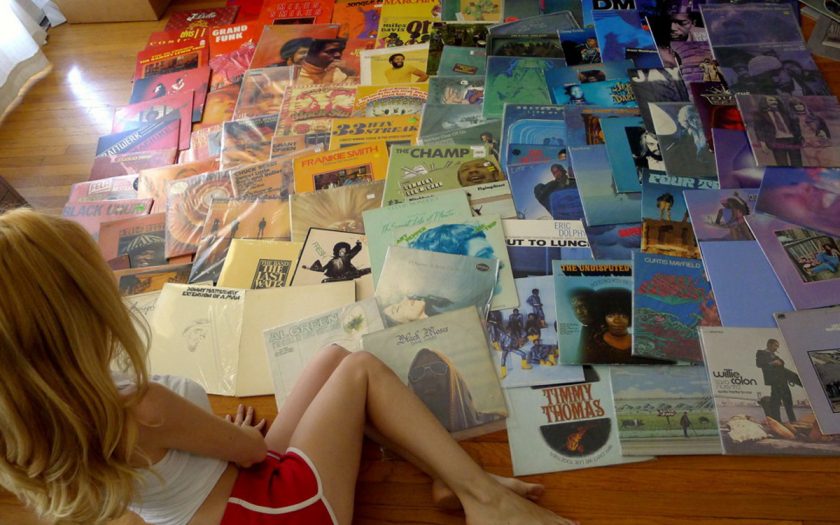Crate digging is the act of searching through old audio for interesting sounds. This can be done on vinyl records and internet archives.
Crate digging is not just collecting vinyl. A lot of people are stuck in the past where you had to buy records to hear music. But in 2019 crate digging can mean more than just hunting for vintage records. Music lovers in the past would have killed for the technology to magically play any song in the world by searching for the lyrics. I mean just have murdered someone. So while you are enjoying an afternoon poring over rows of records don’t forget about your computer.
Here are some tips on where to go crate digging, and how to find interesting music and audio samples you have never heard before. The idea is that you can sample them in your own music productions. Hip hop and EDM producers do this literally all the time. When you get good enough you will be able to tell what songs have been sampled in new music just by listening to it.
Analog Crate Digging

If you want to lug around crates of old records that could be stored on a single laptop or USB drive that’s your problem. There are a lot places you can still find old vinyl records, as well as other mediums such as cassette tapes, 8-track tapes, video tapes, laser discs, compact discs (CD’s) and DVD’s. There are also ecommerce sites that specialize in selling vinyl records. Some musicians still release them in limited quantities for the audiophiles who swear that it sounds slightly better than digital, and will pay thousands to procure a limited edition release or original recording.
Record Stores
Records stores used to be a place where music industry people congregated to talk about music and pass out flyers. There are a few vinyl record stores stubbornly hanging on, but now they are more of an oddity. Still a lot of people visit and then post on social media about going record shopping. And take a selfie while they flip through records to show how hip they are.
Rolling Stone knows A LOT about old music. They list the ten best record stores in America as: Electric Fetus in Minneapolis, Amoeba in Los Angeles, Reckless Records in Chicago, Waterloo in Austin, Grimey’s New & Preloved Music in Nashville, Newbury Comics in Boston, Good Records in New York City, Easy Street Records & Cafe in Seattle, Goner Records in Memphis, and Jackpot Records in Portland, Oregon.
Every April since 2007 the top record stores participate in Record Store Day. It’s a chance to get deep discounts, meet artists, see live performances, network with other audiophiles and score new releases on vinyl. Visit their website to find participating shops near you.
Thrift Stores
One way to get a great deal on vintage records is to check out thrift stores. They usually have old recordings of music somewhere in the back. Usually they are beat to shit and the grooves are all scratched up. But every once in awhile you discover a gem. The prices are generally low enough that you can afford to buy a record just because you like picture on the album cover.
Old People’s Stuff
Older relatives and friends might have old vinyl in storage somewhere. You should ask before you take it because stealing from the elderly is wrong. They will probably say yes unless hoarding is an issue. Or they might be record collectors themselves. Then they might come after you.
Garage Sales
Garage sales and estate sales are another way to find old recordings on various mediums. Check the classifieds and internet boards in your local area. They happen almost every weekend. But again there is no guarantee the records will be in the best condition or even playable.
Vinyl Conventions
Certain people are so into vinyl record collecting that they have regular record shows and conventions across the country. Groove Vinyl recommends that you arrive early and come prepared. You should bring cash because most collectors don’t accept credit cards. It is considered acceptable to barter over the price. Don’t forget to bring a bag to carry your purchases.
To find a record show near you check out the calendar at VinylTimes.com. Check the local newspapers. Or do a Google search for vinyl record conventions near you.
Online Stores
If you want to score a foreign release you may have to shop for it online. You can find rare records on Ebay and Amazon, but there is no guarantee you will get the best deal. Other web stores that carry vinyl records include Urban Outfitters, Best Buy, Reverb, Discogs, SoundStageDirect and Barnes & Noble. You should check your favorite artists websites every once and awhile to see if they are releasing music on vinyl. Usually they offer some kind of package deal with merch.
Digital Crate Digging

Don’t forget to search for audio on the internet. It’s one of the fastest ways to uncover new audio samples. Any song recorded before 1978 loses its royalty fee in 70 years after the death of the composer. And anything recorded before that loses its royalty fee in 95 years. That means you are allowed to reuse vintage sounds. There is also the Creative Commons to explore for stuff that random people on the internet have made. That is not to say you can just steal it. It is bad form and some people may recognize it. Be sure to check the license before reusing sounds.
Music Services
First of all never forget that music providers like iTunes, Spotify, Amazon, Beatport and SoundCloud exist. The majority of albums and singles are posted up there so that fans can stream and download them. In turn the artists receive payment for their music. However not every song and album in the world is going to be on there. Some artists are big divas who refuse to stream their music. For example you couldn’t stream Led Zeppelin, the Beatles or Prince for years up until recently. Other times they decide they don’t like their old music for whatever reason.
In order to support the artist it’s a good idea to stick to legitimate music providers, and not shady torrent sites. There is a degradation in audio quality when you illegally download music. And it could be a virus. You can just as easily save your favorite songs on a playlist and listen to that. If you really want to remix a track, mp3’s are something like $1.29, or less than the cost of a soda.
YouTube
When you can’t find a song on other music platforms, YouTube is the next best place to check. A lot of people upload music and other clips onto YouTube, usually to get views. Although there is no guarantee it will stay up there with all the record company bots crawling around protecting their money — I mean artist’s music. There are ways to rip audio and video to sample it or make funny GIF’s and mp4’s. But the audio and video quality will be not as good as something you paid for.
There is also a lot of Creative Commons video footage on YouTube that you are encouraged to download and remix. Depending on the license they may ask that you give them some of the credit if you reuse it for your production. But that’s just the classy thing to do.
CC Archives
Creative Commons archives are bursting with free music, videos and books that you can download and reuse for free. Oftentimes there is vintage audio and footage that looks really cool. There are also a lot of school projects, porn and weirdos ranting about conspiracies. Some of the best archive websites are the Internet Archive, Creative Commons and the Free Music Archive.
Other References
It’s a good idea to research the music that you discover to learn more about it. Then you can go back another step and listen to the music that influenced those artists. And then you can go back another step, and so on until you go so far back in history that audio recording were not invented yet. So then you have to learn how to read music so you can go even further back in time.
To check out an artist or band’s discography, or every song and album they ever recorded, try Discogs.com. To find out what music is sampled in a track, visit WhoSampled.com. To learn who is credited on certain music, or who wrote and composed a song, go to AllMusic.com.
Cover image by HeightFiveSeven.

